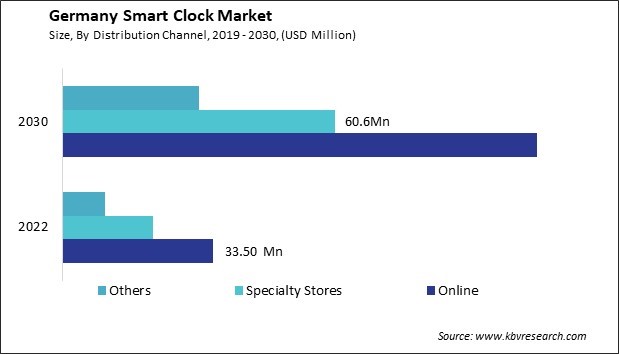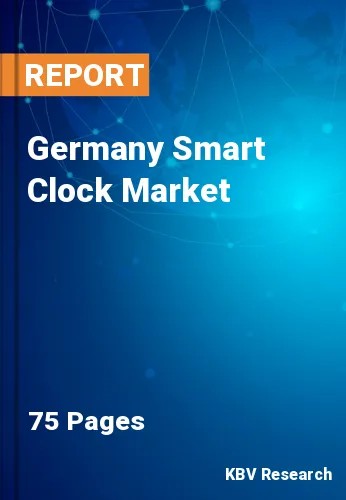The Germany Smart Clock Market size is expected to reach $196.2 million by 2030, rising at a market growth of 15.4% CAGR during the forecast period. In the year 2022, the market attained a volume of 1,170.3 thousand units, experiencing a growth of 15.4% (2019-2022).
The smart clock market in Germany has experienced significant growth and innovation, driven by the country's tech-savvy consumer base and robust digital infrastructure. Security features are also a key consideration for German consumers, and smart clocks often include robust privacy settings and secure connectivity protocols. As privacy concerns continue to shape consumer choices, smart clock manufacturers in Germany prioritize data protection to ensure user trust and compliance with stringent privacy regulations.

Moreover, the emphasis on sustainability in Germany has influenced the smart clock market, with manufacturers incorporating eco-friendly materials and energy-efficient technologies. This aligns with the environmentally conscious preferences of German consumers, contributing to the overall appeal of smart clocks in the industry. The ability of smart clocks to provide hyper-localized weather information is a notable advantage. Users can set their preferred location, allowing the smart clock to retrieve precise weather data for their immediate surroundings
The inclusion of weather-related features in smart clocks is increasingly becoming a popular trend, aligning with the demand for comprehensive and real-time information in a single device. In Germany, where weather conditions can vary significantly, the integration of weather-related functionalities in smart clocks has proven to be particularly useful for consumers.
The smart clock market in Germany has witnessed a remarkable surge in recent years, primarily fueled by the rising demand for consumer electronics. One of the driving forces behind the escalating popularity of smart clocks is the increasing reliance on interconnected devices within households. Germans, known for their affinity towards technological advancements, are embracing smart clocks for their ability to seamlessly integrate with other smart devices, such as smartphones, smart home systems, and wearable gadgets. This interconnectedness allows users to effortlessly manage various aspects of their daily lives, from setting alarms to monitoring weather updates and controlling smart home appliances.
Advanced functionalities like voice recognition, artificial intelligence, and personalized automation have influenced purchasing decisions. German consumers are seeking smart clocks that display the time and serve as intelligent hubs capable of enhancing overall lifestyle convenience. The emphasis on energy efficiency and sustainability is another trend driving the smart clock market in Germany. Consumers increasingly opt for eco-friendly and energy-saving devices, aligning with the country's commitment to environmental conservation. Manufacturers are responding to this demand by incorporating energy-efficient technologies and eco-friendly materials in the design and production of smart clocks.
Furthermore, the robust infrastructure supporting IoT (Internet of Things) in Germany has significantly contributed to the growth of the smart clock market. The widespread availability of high-speed internet and the proliferation of smart home ecosystems have created a conducive environment for adopting these intelligent timekeeping devices.
According to the Germany Trade & Invest, in Germany, the Internet of Things (IoT) expenditure is anticipated to surpass EUR 35 billion, with IoT-generated revenue poised to double from EUR 22.5 billion in 2018 to a projected EUR 45 billion by 2023. This underscores the pivotal role of IoT applications, specifically in the realm of smart clocks, within the country's evolving technological landscape. Thus, the surge in Germany's smart clock market reflects a tech-savvy consumer base's increasing preference for interconnected, advanced devices that seamlessly integrate into their daily lives.
In the thriving landscape of Germany's smart clock market, the increasing focus on advertising and promotions has become a pivotal strategy for brands aiming to capture the attention of tech-savvy consumers. One of the primary drivers behind the intensified advertising efforts is the growing awareness among German consumers about the multifaceted features that smart clocks offer. Manufacturers are keen to highlight how these devices seamlessly integrate into the connected home ecosystem, providing users with both the time and a range of smart functionalities.
In promotions, brands strategically align themselves with the tech-savvy lifestyle Germans embrace. Collaborations with popular influencers and tech experts are on the rise, with social media platforms being a focal point for reaching the target audience. Promotional campaigns emphasize smart clocks' energy efficiency and sustainability, aligning with Germany's environmentally conscious consumer base. Moreover, retailers are crucial in promoting smart clocks through in-store displays and exclusive bundle offers. As German consumers prioritize quality and reliability, brands are investing in product demonstrations and interactive displays to showcase the advanced features of smart clocks.
The competitive landscape has led to ongoing innovation, with brands leveraging augmented reality (AR) experiences to allow consumers to place smart clocks virtually in their homes before purchase. This immersive approach aims to bridge the gap between online exploration and in-store experience, catering to the diverse preferences of German consumers. Therefore, the German smart clock market is witnessing a strategic shift towards intensified advertising and promotions, driven by a growing awareness of the multifunctionality of these devices.
In Germany, renowned for its engineering prowess and commitment to innovation, the smart clock market has witnessed the emergence of several notable companies offering cutting-edge solutions that blend traditional craftsmanship with modern technology.
Braun GmbH known for its German engineering and design; Braun GmbH has made significant contributions to the smart clock market. Braun's smart clocks often embody a minimalist and functional design philosophy, emphasizing clarity and ease of use. These clocks may feature innovative display technologies, integration with smart home ecosystems, and unique alarm functionalities. Braun's commitment to precision and simplicity positions its smart clocks as popular choices among consumers who appreciate German craftsmanship.
Siemens AG, a global powerhouse in electronics and electrical engineering, has expanded its product line to include smart clocks tailored for modern living. Siemens smart clocks may incorporate advanced connectivity options, temperature sensors, and compatibility with voice-activated assistants. The integration of smart technology with Siemens' engineering expertise results in clocks that seamlessly fit into the connected home ecosystem.
Technoline a German brand with a strong presence in the weather station and smart clock market, Technoline offers a variety of smart clocks. These clocks often feature weather forecasting capabilities, indoor climate monitoring, and radio-controlled time synchronization. Technoline's commitment to providing accurate and reliable information positions its smart clocks as practical additions to households and offices.
Auriol (Lidl), a brand associated with the German discount supermarket chain Lidl, has introduced smart clocks as part of their tech product offerings. These clocks may include features like radio-controlled timekeeping, weather information, and programmable alarms. Auriol's smart clocks, often available at affordable prices, appeal to a broad consumer base looking for reliable and functional devices.
TFA Dostmann GmbH & Co. KG specializes in weather and measuring instruments, and their smart clock offerings often include weather stations with clock functionalities. These clocks may provide real-time weather data, temperature readings, and humidity levels, catering to consumers with an interest in environmental monitoring. As technology continues to evolve, these companies are likely to introduce new features and innovations, further shaping the landscape of smart clock market in Germany.
By Distribution Channel
Our team of dedicated experts can provide you with attractive expansion opportunities for your business.

